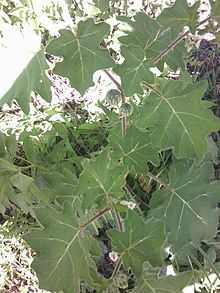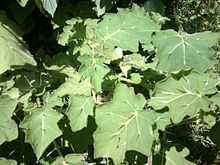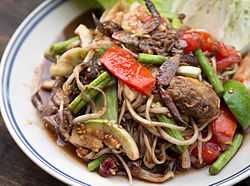Solanum xanthocarpum
| Turkey Berry | |
|---|---|
 | |
| Scientific classification | |
| Kingdom: | Plantae |
| (unranked): | Angiosperms |
| (unranked): | Eudicots |
| (unranked): | Asterids |
| Order: | Solanales |
| Family: | Solanaceae |
| Genus: | Solanum |
| Species: | S. xanthocarpum |
| Binomial name | |
| Solanum xanthocarpum | |
| Synonyms | |
|
Solanum surattense [1] | |

Solanum xanthocarpum, also known as the Thai eggplant, is a medicinal herb common in Bangladesh, Nepal and India.
The Thai eggplant (Solanum xanthocarpum, Thai: มะเขือ [máʔkʰɯ̌ːə]) is a variety of eggplant used in Southeast Asian cuisines. It is also cultivated in Sri Lanka and used in Sri Lankan cuisine. The most common eggplants in Thai cooking are the round white or green ones about the size of a golf ball. Common cultivar types in Thailand are Thai Purple, Thai Green, Thai Yellow, and Thai White.
Thai eggplants are essential ingredients in Thai curry dishes. In Kaeng tai pla,[2] green[3] and red curry, Thai eggplants are quartered and cooked in the curry sauce where they become softer and absorb the flavor of the sauce.
In many Thai restaurants in the United States, Thai eggplants are usually replaced by the available eggplants in that country or by green peas.[4]
According to Ayurveda it is used for treating bronchitis, asthma, fever, lumbago, piles (specially bleeding piles), thirst, urinary and heart disease.
Gallery
-

The flowers of the Thai eggplant
-

The fruit of the Thai eggplant. The white residue on the leaves is common.
-
Kaeng tai pla with Thai eggplants and bamboo shoots
-

The eggplants are often eaten raw in Thailand, for instance in som tam Lao
